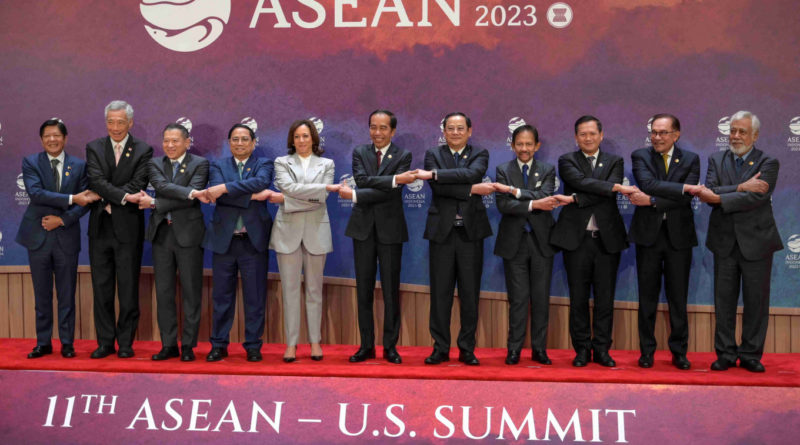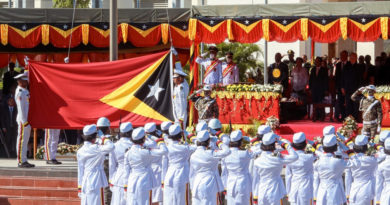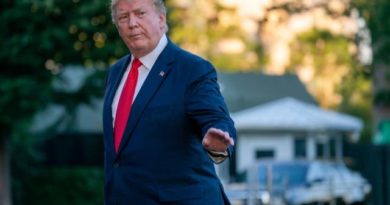OP ED | OPINION-EDITORIAL | The ‘dream’ trilateral summit
Top delegates at the ASEAN-US Summit (from left), Philippine President Ferdinand Marcos Jr., Singaporean Prime Minister Lee Hsien Loong, Thai Permanent Secretary of the Ministry of Foreign Affairs Sarun Charoensuwan, Vietnamese Prime Minister Pham Minh Chinh, United States Vice President Kamala Harris, Indonesian President Joko “Jokowi” Widodo, Lao Prime Minister Sonexay Siphandone, Brunei Sultan Hassanal Bolkiah, Cambodian Prime Minister Hun Manet, Malaysian Prime Minister Anwar Ibrahim and Timor-Leste Prime Minister Xanana Gusmao, pose for a “family photo” on on Sept. 6, 2023 during the 43rd ASEAN Summit in Jakarta. (Reuters/pool/Bay Ismoyo) (Reuters/POOL)
.
Editorial board
The Jakarta Post
Versi Bahasa Indonesia

Tensions among the three North Asian nations of China, Japan and South Korea are dubbed the most volatile in the world, due to the military and economic power and overlapping territorial claims among the world’s second-largest, third-largest and 12th-largest economies, respectively.
Despite the countries’ political and border conflicts, their economic ties are so strongly related that they will suffer if their disputes worsen or escalate into an open conflict.

Fortunately, there is some good news. South Korean President Yoon Suk-yeol is soon to host a trilateral summit with Chinese President Xi Jinping and Japanese Prime Minister Fumio Kishida, hopefully before the end of the year.
The three leaders had agreed in principle to meet again after their last summit in December 2019 in Chengdu, in China’s Sichuan province.
In early September during the 43rd ASEAN Summit and Related Summits in Jakarta, Chinese Premier Li Qiang, Prime Minister Kishida and President Yoon agreed to proceed with the trilateral summit, because they realized direct communication among them would help deescalate tensions.

President Xi is expected to attend the upcoming meeting in person.
ASEAN expects its three dialogue partners China, Japan and South Korea to demonstrate willingness for rapprochement to reduce tensions in the region. This is because any economic or security issues involving the three Asian economic giants are certain to significantly impact the people in Southeast Asia.
ASEAN has held an annual summit with each of the three nations since 1999. Its three northern neighbors are important partners to the Southeast Asian bloc, considering the economic cooperation they have forged so far and the development assistance the three countries have poured into individual ASEAN member states.
Cooperation between ASEAN and the three countries has followed the principles of mutual benefit and equality. The 10-member bloc has a combined population of over 670 million and a combined gross domestic product of US$3.7 trillion that is projected to keep growing. It represents the third largest economy in Asia and the fifth largest in the world.

Regional peace and stability will therefore push cooperation between ASEAN and its three North Asian partners to a new level. The problem is, these partners have been embroiled in prolonged conflicts between them.
An example is the ongoing dispute over the history of Japan’s occupation of South Korea, as well as overlapping territorial claims, though Yoon has repeatedly said he wants to normalize relations with Tokyo.
China’s most serious concern regarding its two neighbors is their military cooperation with its archrival, the United States.
In August, President Joe Biden hosted a meeting with Kishida and Yoon at Camp David, where they agreed to closer military and strategic cooperation: Tokyo and Seoul need Washington to face China and North Korea.

Beijing’s relationship with Seoul has soured since 2017 over the deployment of a US antimissile system in South Korea, with Seoul strongly rejecting Beijing’s demand that the weapons be withdrawn.
The rising threat of North Korea as a nuclear arms producer and its tendency to use deadly weapons for ransom and Beijing’s intent to use military force “if necessary” to integrate Taiwan into the Mainland are among the major sources of tension and threat to security in the region.
Two weeks after the Camp David summit, North Korean leader Kim Jong-un called the three leaders “gang bosses” and criticized the announcement of trilateral military exercises as “reckless confrontational moves of the US and other hostile forces” contributing to instability and raising the risk of a nuclear war.
Kim is good at condemning other nations, especially the US, Japan and South Korea. Still, he should also realize that the world sees Pyongyang’s actions as a threat to global peace and security because he is obsessed with having nuclear capabilities to use against his neighbors.
We all hope that China, Japan and South Korea will hold their summit soon, and that their leaders are ready to compromise with each other, certainly for the sake of their national interests, but also for security and stability in the wider Asian region as well as the world.
Jakarta
● Mon, October 2, 2023
.

@[email protected]
.









